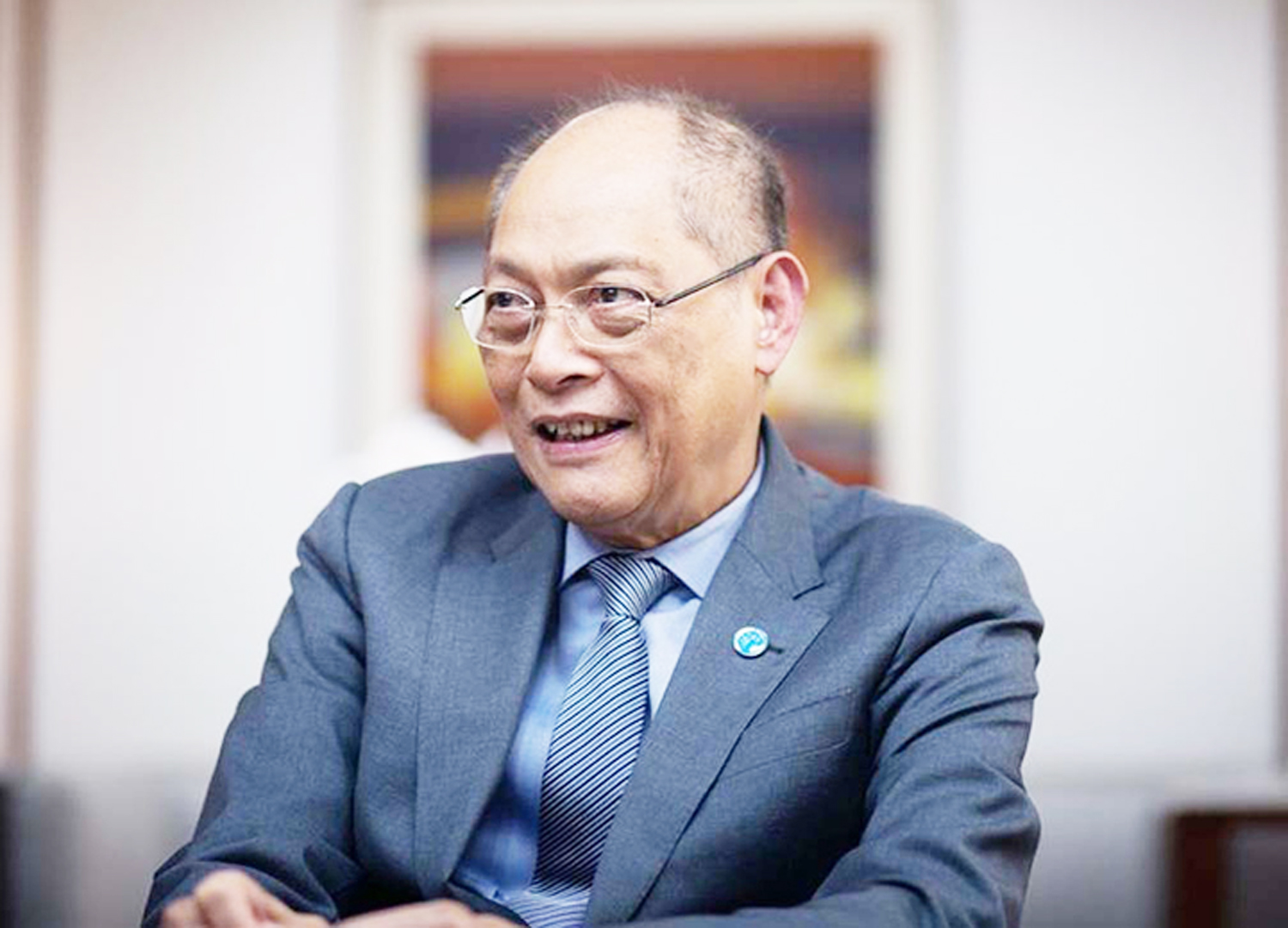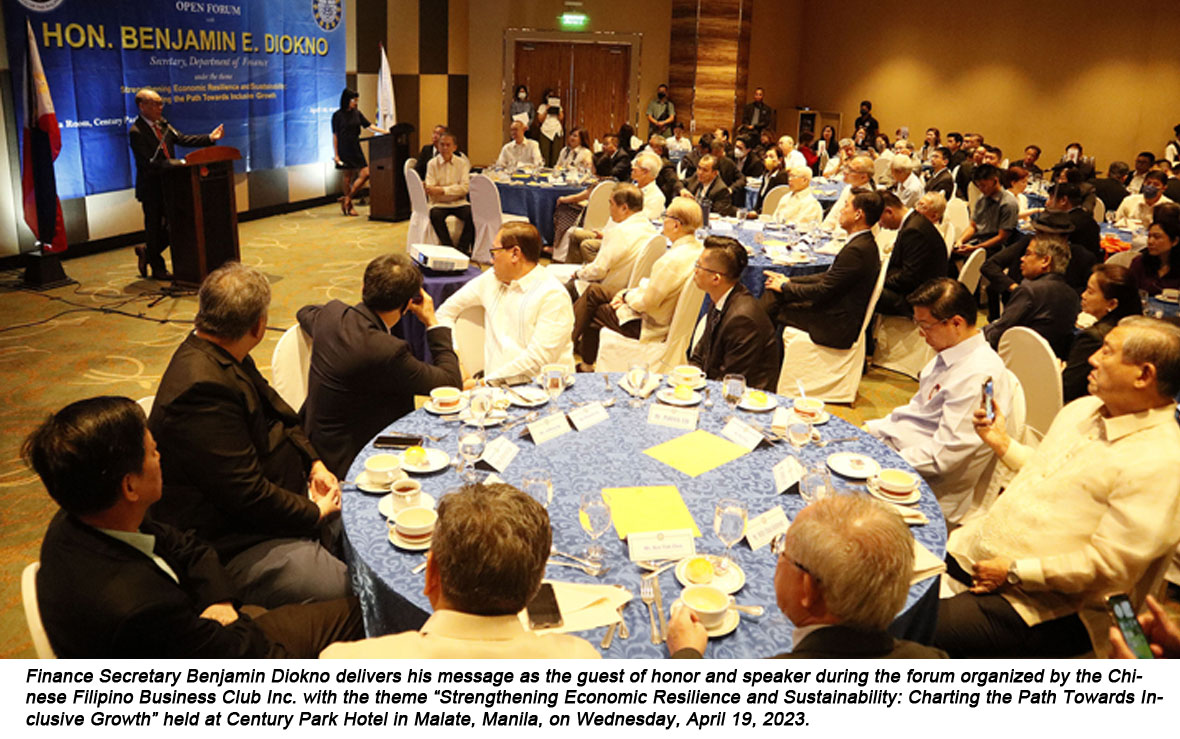FINANCE Secretary Benjamin Diokno on Wednesday encouraged members of the Chinese Filipino Business Club to do more business in the country as the Philippines is now in a “very good shape” for investments.
Speaking at the monthly meeting of the Chinese-Filipino Business Club at the Kachina Lounge of Century Park Hotel in Manila, which organized a forum on “Strengthening Economic Resilience and Sustainability: Charting the Path Towards Inclusive Growth,” Diokno said the economic liberalization measures the Philippine government has enacted have opened up key high-growth sectors to international participation.
“As business leaders, I invite you to work with the Philippine government in building a dynamic and thriving economy that our people deserve,” he added.
“We are in a very good shape than many developed countries. Before the crisis, our debt-to-GDP ratio was only 39 percent. It went up to around 64 percent because of the pandemic, we borrowed money to buy vaccines, invest in more hospitals, and provide ayudas due to a very long lockdown. But that’s not bad, other countries have 150 to 200 percent debt-to-GDP ratio,” he said.
 According to Diokno, the country’s debt-to-GDP ratio will be reduced from the current 63.7 percent to less than 60 percent by 2025.
According to Diokno, the country’s debt-to-GDP ratio will be reduced from the current 63.7 percent to less than 60 percent by 2025.
“We are the fastest-growing country in this fastest-growing region; we can compete with Indonesia and Vietnam,” he added.
The forum was organized by the Chinese Filipino Business Club Inc. (CFBCI) led by its president Stephen Sia, Executive Vice President Samuel Lee Uy, Vice President Antonio Hilario and Corporate Secretary and Director Henry Go.
The CFBCI is one of the most prominent nonprofit organizations in the Filipino-Chinese community with membership of more than 400 nationwide coming from the finance, manufacturing, real estate development travel and tourism, fuel, chemical, hardware, construction, banking and other sectors who are the crème de la crème of the Sino-Philippine community.
’Nice story to tell’
Diokno, who served four Philippine presidents, said the Philippines is easy to sell for investment because it has a “nice story to tell.”
“I have seen the ups and downs of the Philippine economy, I keep telling the world that this time all stars are aligned [with the Philippines], this is our moment, we should take advantage. During the pandemic, we did our homework, that’s why we are in a better position now,” said Diokno referring to the structural reforms that the government passed into laws.
These reforms, Diokno said, are the amendments to the Retail Trade Liberalization Act (RTLA), Foreign Investments Act (FIA), and the Public Service Act (PSA), which relaxed foreign restrictions on investments in the country.
Also, the Finance secretary said companies engaged in solar, wind, hydro, and tidal energy are welcome to invest in the Philippines’ renewable energy (RE) sector now that it has been opened up to full foreign ownership.
Aside from allowing full foreign ownership in certain sectors, the country now offers a simpler fiscal incentives system that is considered transparent, time-bound, targeted and performance based. This is due to the Corporate Recovery and Tax Incentives for Enterprises or CREATE law, Diokno said.
Diokno also cited the country’s foreign reserves of more than $100 billion, which is equivalent to seven months of imports unlike before when the country’s foreign reserves can only buy two weeks of imports.
He said the significant changes that have been engineered in the country allow for the entry of more investments. He cited the so-called Strategic Investment Priority Plan that lists projects that are eligible for investments.
“If we united, we can really do a lot of things, [That’s why] i am very optimistic, we traveled to Davos, England, London, Frankfurt, and three times in the US, we are selling the country [for investments] and there’s a lot of interest in the Philippines,” he said.
“I want you to participate in that kind of opportunity for Filipino-Chinese, in fact that is my message to foreigners. If you don’t invest in the Philippines, that’s your loss,” Diokno told Chinese businessmen.
Diokno encouraged them to participate in 194 high-impact infrastructure projects of the government, as approved by the National Economic and Development Authority (Neda) Board. These are in irrigation, water supply, flood management, digital connectivity, health, power and energy and agriculture.
Earlier, Diokno said the government is determined to sustain high infrastructure investment for the next six years through the public-private partnership (PPP) mechanism, which will enhance energy, logistics, transportation, telecommunications, and water infrastructure in the country.
E-governance
Meanwhile, he vowed the passage of the e-governance bill and ease of doing business bill for easier business transactions in the Philippines.
The e-governance bill institutionalizes the use of ICT and emerging technologies to improve the efficiency of public services. It is expected to enhance the ease of doing business in the country and improve public trust in the government.
According to Diokno, reforms to improve the simplicity, fairness and efficiency of the tax system will also be approved into law.
These include the Real Property Valuation and Assessment bill, Passive Income and Financial Intermediaries Taxation bill and Value Added Tax on Digital Transactions bill.
“We hope to enjoin the support of business communities in pushing for these reforms that will radically upgrade our tax system. These bills will complement the list of structure reforms we are implementing,” he said.
“The Marcos Jr. administration will put greater emphasis on collaborations with local governments, private sector, and civil society,” he added.

